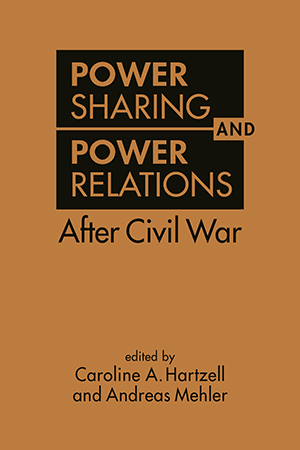Caroline A. Hartzell and Andreas Mehler, eds.
There are numerous studies on the role of power-sharing agreements in the maintenance of peace in postconflict states. Less explored, however, is the impact of power sharing on the quality of the peace. Do power-sharing institutions in fact transform the balance of power among actors in the aftermath of civil wars? And if so, how? As they address these issues, seeking to establish a new research agenda, the authors provide a rich new analytical approach to understanding how power sharing actually works.
Caroline A. Hartzell is professor of political science at Gettysburg College. Andreas Mehler is director of the Arnold-Bergstraesser-Institut and professor of development policy and the theory of development at the University of Freiburg.
"The book's argument is compelling.... The benefit of this comprehensive conceptualisation of power-sharing is coupled with a nuanced study across different chapters of the specific power-sharing mechanisms that are institutionalised in different peace agreements." —Dawn Walsh, The RUSI Journal
"Highly recommended.... This book moves power sharing from the niche field of conflict resolution to the much broader arena of comparative politics, where it belongs."—Roy Licklider, Rutgers University
"Interrogating the power in power sharing, the authors ... give a nuanced and accurate picture of how power sharing works, and help to explain why it sometimes leads to peace and other times to failure."—Allison McCulloch, Brandon University








